Human Rights Initiatives
NYK Group's Basic Stance on Human Rights
The NYK Group established the NYK Group Human Rights Policy based on the United Nations Guiding Principles on Business and Human Rights. We support and respect the United Nations International Bill of Human Rights, the International Labour Organization's Declaration on Fundamental Principles and Rights at Work, international treaties and declarations related to the protection of human rights, including conventions on workers' human rights such as wages and working hours, the OECD Guidelines for Multinational Enterprises and the United Nations Declaration on the Rights of Indigenous Peoples, and the Ten Principles of the United Nations Global Compact.
To fulfill our responsibility to respect human rights of our stakeholders, this policy applies to all executives and employees of the NYK Group, and we encourage our suppliers, contractors, agents and other parties involved in our business and supply chain to comply with the policy.
This policy was approved by the Board of Directors on November 24, 2022, for its establishment and disclosure.
In February 2022, the Risk Management Committee adopted human rights violation risk as a new critical risk. The Risk Management Committee is convened twice a year and chaired by the president. The committee is composed of chief executives and the executive officer in charge of promoting ESG management, including four members of the Board of Directors. The committee identifies critical risks based on reports from each headquarters, determines the headquarters responsible for advancing countermeasures for each critical risk, and promotes risk mitigation activities for the entire Group.
- More Information:
Respect for Human Rights
The Group respects the human rights of all people involved in our business activities, and recognizes and respects various values and cultures as the foundation of our corporate activities.
Excerpt from NYK Code of Conduct
Chapter 4 Respect for Human Rights and Diversity of Cultures
4-1 Respect for Human Rights
We respect human rights and comply with the NYK Group Human Rights Policy.
4-2 Prohibition of Discrimination
We do not engage in any discrimination on the basis of race, creed, religion, sex, sexual orientation, gender identity, nationality, age, origin, disability, disease, or otherwise.
4-3 Prohibiting Harassment
We do not engage in libelous or slanderous acts that violate human dignity, or abusive acts that may be regarded as harassment.
4-4 Respect for Cultures of Countries and Regions
We respect the cultures and customs of countries and regions in which we conduct business, and conduct our business operations in harmony with regional communities and international society.
4-5 Prohibiting Forced Labor or Child Labor
NYK does not engage in inhumane acts such as forced labor or child labor. And NYK does not conduct trade with business enterprises engaged in such acts.
4-6 Establishment and Operation of Fair Personnel Treatment System
NYK promotes equal opportunity in employment, personnel administration, wages, training, promotion, etc., and complies with applicable labor agreements and other agreements with attention to the protection of the rights of workers established in international treaties and in laws and regulations of each country or region in which NYK operates.
- More Information:
To enhance its global business activities, NYK created the company's "CSR Guidelines for Partners and Suppliers," which requests the cooperation and understanding of business partners in promoting CSR activities concerning global social issues such as child labor, forced labor, environmental destruction, etc., in the entire supply chain.
Excerpt from CSR Guidelines for Partners and Suppliers
Chapter 3. Respect for Human Rights and Diversity of Cultures
Respect for Human Rights and Prohibition of Discrimination
Respect human rights, and do not discriminate on the basis of race, creed, religion, gender, sexual orientation, gender identity, national or regional origin, age, mental or physical disabilities, diseases, social status, or any other reason.
Prohibiting Inhumane Treatment
Prohibit any inhumane treatment so as not to engage in any acts that violate human dignity such as libel, slander, or harassment.
Respect for Cultures of Countries and Regions
Respect cultures and customs of countries and regions in which you conduct your business, and conduct your business operations in harmony with regional communities and international society.
Prohibiting Forced Labor or Child Labor
Do not engage in inhumane acts such as forced labor or child labor, and endeavor to ensure appropriate payment of wages. Also, do not conduct trade with business enterprises engaged in inhumane employment.
Respect for Fundamental Rights of Workers
Respect workers' rights, including collective bargaining rights and freedom of association, as prescribed in international treaties and in national and regional laws and regulations.
- More Information:
Framework for Promoting Human Rights Initiatives
In April 2023, we established the ESG Strategy Committee, which succeeded the ESG Management Committee, to discuss the Groupwide policies on ESG management, including the promotion of human rights. The committee met nine times in fiscal 2023. The committee included the deputy chief executive of the ESG Strategy Headquarters as its chair and executive officers representing each headquarters. In addition, an external advisor has been invited to the committee. The committee reports the proceedings of its meetings to the ESG Strategy Headquarters, which then provides advice and recommendations to the Management Meeting and the Board of Directors. Additionally, the UN Global Compact Promotion Committee,*1 part of the ESG Strategy Headquarters, conducts preliminary discussions and then submits proposals to the headquarters.
The ESG Strategy Committee collaborates with the ESG Management Group and other relevant departments to promote human rights within this framework under top management leadership and commitment.
In fiscal 2022, the ESG Management Committee discussed reports on the Group's human rights initiatives and considered formulating a human rights policy. The committee shared the initiatives implemented and reconfirmed that the Group would pursue consistent efforts to promote human rights. The committee also proposed the Management Meeting and the Board of Directors to formulate a human rights policy. The Board of Directors discussed and approved the person responsible for the implementation of the human rights policy.
In fiscal 2023, we maintained our existing basic policies and continued our efforts for human rights, while also holding two discussions within the ESG Strategy Committee about revising the 'CSR Guidelines for Partners and Suppliers,' which were last updated in 2019.
We regularly receive expert advice from a third party, Caux Round Table Japan (CRT Japan),*2 to strengthen the Group's efforts to promote human rights. Third-party expertise is applied at each phase of the implementation process to ensure objectivity and legitimacy. We held 24 regular bi-weekly meetings with CRT Japan in fiscal 2023.
Framework for Promoting Human Rights Initiatives (As of April 1, 2024)
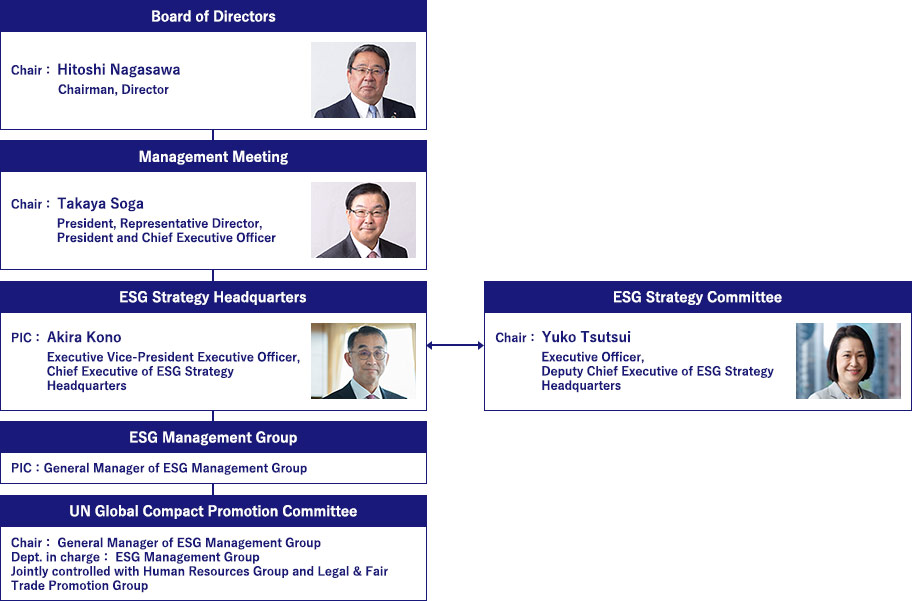
- *1UN Global Compact Promotion Committee
In fiscal 2023, we reorganized the former Global Compact Promotion Committee established in 2010 as the UN Global Compact Promotion Committee. The purpose of the committee is to promote the United Nations Global Compact (UNGC) and to establish systems based on it in the Company and its Group companies. The committee meets quarterly. Through global human resource surveys, as well as processes for human rights due diligence, the committee investigates business execution and matters that may violate the UNGC, confirms facts, and then discusses and determines any corrective measures. - *2Caux Round Table Japan (CRT Japan)
A global network of business leaders working to realize a fair, free and transparent society. CRT Japan supports efforts in responsible business practices and human rights.
- More Information:
Human Rights Training Program for Top Management
We offer internal and external training opportunities for top management to enhance their commitment to human rights initiatives and deepen their understanding of the relationship between business and human rights, thereby advancing the leadership of the Board of Directors.
In August 2022, we conducted an online training program titled "Understanding Business and Human Rights" with Hiroshi Ishida, Executive Director of CRT Japan, as a lecturer. Thirty-five internal and external directors, auditors and executive officers, including the president, attended the program. The participants acquired expert knowledge on the need for business enterprises to respect human rights as well as the importance of implementing measures based on the UN Guiding Principles on Business and Human Rights.
Human Rights Due Diligence
The Group understands that our corporate activities, including the supply chain, could have a direct or indirect adverse impact on human rights. Therefore, we follow the procedures outlined in the UN Guiding Principles on Business and Human Rights and exercise human rights due diligence. Specifically, we identify and assess the Group's activities that have or may have an adverse impact on human rights. Next, we seek to grasp the Group's human rights issues to prevent and mitigate the risk of adverse impact and implement appropriate remedial measures. A follow-up assessment will be conducted to verify the effectiveness of the measures, and the process and the results will be disclosed for review by experts. We implement the above continuous process.
[Our Process to Identify Human Rights Risks and Impacts]
- In identifying and assessing adverse human rights impacts, we first use the knowledge and data of external experts, including data from Verisk Maplecroft (VM)*1 and materials published by international organizations and various other initiatives, to advance our understanding.
- We use internal resources, which includes conducting management-level workshops, to analyze who could potentially be subject to different types of human rights violations in our business projects.
- In the analysis of "who could potentially be subject to different types of human rights violations in our business projects," we examine both our business projects and supply chains and identify salient human rights issues by directly engaging with the rights holders *2 through interviews and questionnaires, while obtaining the understanding and cooperation of the Group companies or suppliers, whichever entities that are managing the rights holders in question. After identifying specific business projects with concerns about possible human rights violation, we ask a third party without any vested interest in the rights holders to conduct interviews and questionnaires in countries where the Group is assumed to have a major impact to ascertain if there are actual or potential human rights violations. We explain the NYK Group's human rights policy to the Group companies and suppliers that directly manage the rights holders in question to obtain their cooperation in conducting the interviews and questionnaires.
- Based on our understanding of actual or potential human rights violations and an assessment of the severity of the adverse human rights impacts (scale, scope, and irremediability), taking into account, as needed, the legal system and social conditions of the country in question, we identify salient human rights issues for the NYK Group. In ascertaining actual or potential human rights violations, reference may also be made to the content of claims made to the grievance mechanisms established within NYK Group, the Group companies, and suppliers.
- The NYK Group will require the Group companies or suppliers that directly manage the rights holders to address the identified salient human rights issues, in other words, to prevent and mitigate the risk of adverse impact. At the same time, the Group will consider exercising our influence for this purpose, including by revising related policies and contractual terms.
- At some interval after the Group company or supplier has implemented remedial measures, the Group will again ask a third party to conduct interviews or questionnaires with the rights holders to confirm that those measures have actually resulted in improvements.
The Group delineates the ways in which multiple layers of stakeholders are to be engaged in the human rights due diligence process, and enhances the effectiveness of this process through a cycle of "identification and assessment," "prevention and mitigation," "follow-up assessment," and "information disclosure," as described above.
- *1A leading global risk analytics, research and strategic forecasting company.
- *2Rights holders, meaning holders of rights (human rights), are those groups and stakeholders who may be affected by corporate activities.
[ Past Initiatives ]
In 2022, we with the support of Verisk Maplecroft conducted an assessment to advance human rights due diligence. We have identified potential risk factors that can cause or contribute to human rights violations in our corporate activities. We have targeted three operations, namely, automotive logistics, oceangoing shipping (seafarers) and ship recycling (scrap workers), and assessed the risks of human rights violations in the countries or regions in which we operate these business activities.
Furthermore, we conducted a human rights due diligence workshop for managers of 10 groups of five relevant headquarters and divisions. The workshop, supported by CRT Japan, was held in June 2022 and brought together 26 managers. The purpose of the workshop was to receive feedback from our managers on the results of Verisk Maplecroft's assessment, based on their actual work. During the workshop, participants also discussed other business operations that form part of our supply chain in addition to the three mentioned above, including shipbuilding and port logistics. Based on their experiences, participants exchanged opinions, identified, analyzed and summarized the potential risk factors for human rights violations at each stage of the value chain at a practical level. Participants also shared future concerns and challenges associated with managing the risks of human rights violations, such as a lack of understanding of the real situation concerning indirect subcontractors within and outside Japan, and highlighted the importance of understanding the risks of human rights violations in the global supply chain.
Verisk Maplecroft's assessment and the human rights due diligence workshop identified the salient human rights issues for the NYK Group as follows:
Procedure for Identifying Salient Human Rights Issues
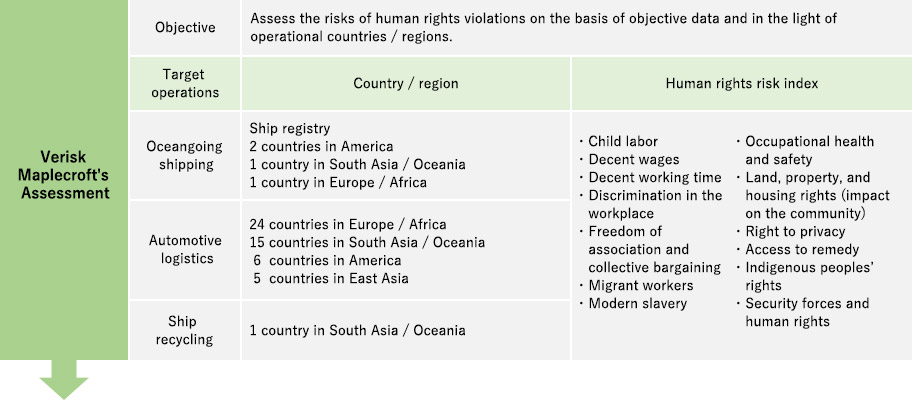
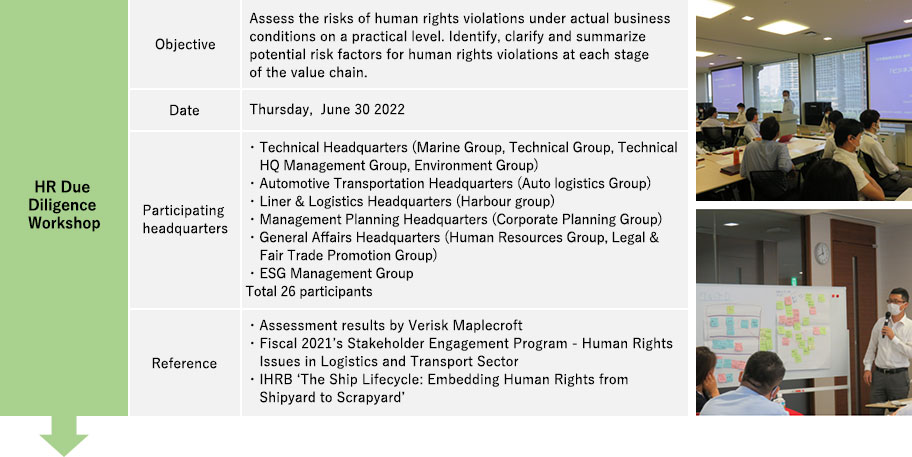
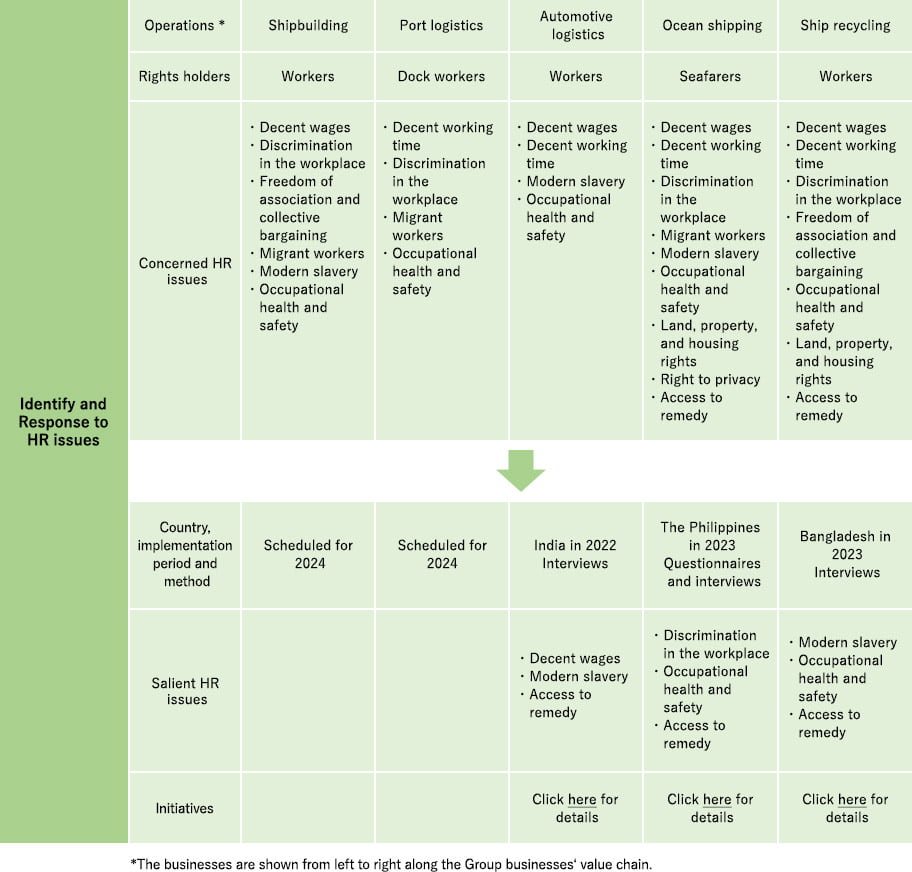
Please see below for the salient human rights issues for the NYK Group, identified and assessed through the above procedure and our initiatives.
[ Oceangoing Shipping (seafarers) ]
The NYK Group is committed to protecting seafarers' rights by ensuring compliance with the requirements of Maritime Labour Convention 2006 (MLC, 2006), which sets out the basic rights of seafarers and occupational health and safety on board. We use our safety management system (SMS) that incorporates the requirements, and our assessment system to confirm the MLC compliance status of ship management companies and the ships they manage.
We recognize that seafarers' human rights concerns begin with recruitment and continue while they serve on board and even after they disembark, and that there are issues to be addressed at each phase. We are committed to conducting ethical recruitment practices prior to boarding; preventing violations of rights to occupational health and safety; ensuring the right to privacy, freedom of association, and collective bargaining; assuring decent working time; providing access to remedy; and preventing discrimination in the workplace while on board. Our initiatives after disembarkation include maintaining seafarer retention through employee engagement and improving the accessibility of financial services for seafarers.
[ Automotive Logistics (Workers) ]
Workers in the automotive logistics business are involved in a wide range of operations. Many of the workers are also employed through supplier partners, and may provide services on the customers' premises. The NYK Group encourages appropriate employment management practices by supplier partners, and to enhance the effectiveness, provides a mechanism whereby workers employed through supplier partners can raise their voices directly to the Group. We work with the understanding and cooperation of our customers in improving situations, and hope also to contribute to promoting our customers' own business and human rights initiatives.
[ Ship Recycling (Workers) ]
Ship recycling involves dangerous work, including cutting the ship's hull in high places, handling harmful chemicals such as mercury, lead, and asbestos left on abandoned ships, as well as residual heavy oil, and transporting cut scrap. To prevent the risk of death, injury, or damage to the health of ship recycling workers of (indirect) business partners that recycle ships owned by NYK and its group companies, as well as the spillage of hazardous materials into the ocean and the resulting damage to the health of nearby residents, NYK has established a ship-recycling policy and is working to promote responsible ship recycling in accordance with the International Maritime Organization (IMO)'s Hong Kong International Convention for the Safe and Environmentally Sound Recycling of Ships, European Union (EU)'s Ship Recycling Regulation, and related regulations of the International Labour Organization.
- More Information:
[ List of Initiatives ]
The Group's salient human rights issues and initiatives are summarized below for your reference.
| Business | Rights Holders (Company implementing measures) |
Salient Human Rights Issues | Future Initiatives Under Consideration/ Initiatives Implemented or in Progress |
|---|---|---|---|
| Oceangoing shipping | Seafarers (NYK-Fil Ship Management, Inc.) |
Discrimination in the workplace | [Scheduled] NYK-Fil will explain to seafarers that the difference in treatment in terms of pay for different nationalities is not due to "nationality-based discrimination," but rather due to the living standard in the seafarers’ native countries for supporting their families (i.e., living wages). In terms of meals, NYK-Fil will also clarify that the budget per person is the same for all, regardless of nationality. |
| Occupational health and safety | [Scheduled] NYK-Fil will continue the "Healthcare Program" to create a working environment and culture where seafarers can report their injury or illness to the company without fear of missing out on boarding opportunities. | ||
| Access to remedy | [Scheduled] Confidentiality of information should be maintained in "Assist Me," NYKSM’s grievance mechanism for seafarers, so that informers’ personal information and grievances are kept confidential. As the operator of "Assist Me," NYKSM will reconfirm with NYK-Fil how information is being managed and discuss improvements. | ||
| Others | [Scheduled] NYK-Fil will consider how to continually respond to seafarers’ requests regarding benefits and also continue to raise awareness about lesser-known schemes. | ||
| Automotive logistics | Workers (NYK India Private Limited) |
Decent wages | NYK India has provided explanations of salary rules, including the pay raise system, to all workers employed through the supplier partners. |
| Modern slavery | NYK India demanded supplier partners execute appointment letters with each worker employed through the supplier partners, as required by Indian law, and pay slips in a language each worker can understand. | ||
| Access to remedy | To enhance the effectiveness and transparency of "Samvaad," a place to engage with workers and also used as a grievance mechanism for workers, NYK India delineated the flow of the grievance mechanism. | ||
| Ship recycling | Workers (PHP Ship Breaking & Recycling Industries Limited) |
Modern slavery | PHP has enriched the content of existing statutory appointment letters so that workers engaging in ship recycling can properly understand workers’ risks and rights before starting the duties. With all workers, PHP has decided to sign employment contracts that indicate workers’ risks and rights. |
| Occupational health and safety, employability, access to remedy | PHP established the workers’ education center "Sromik Shikkha Kendro," outsourcing its operation and management to a local NGO, and began providing literacy education for workers. | ||
| Occupational health and safety | PHP began offering workers more comfortable uniforms and protective equipment. PHP also installed a water cooler in the yard facility and provides rest areas with benches and parasols, in addition to resting rooms with bedding, in the workshop. | ||
| Others | PHP applied heat-resistant paint on the dormitory roof to make the dormitory cooler for better comfort. The company is also installing a turbine ventilation fan on the roof for better indoor ventilation. In addition, PHP planted about 40 trees in front of the employee dormitory as a cover from direct sunlight. PHP has started constructing a new dormitory with bathrooms and air conditioning for supervisors, site supervisors, and other mid-level workers. |
||
| PHP is discussing the possibility of providing housing for workers with families. |
Human Rights Enlightenment and Education
The NYK Group conducts education and enlightenment programs on human rights to promote activities in line with its human rights policy.
Enlightenment and Education for Executives and Employees
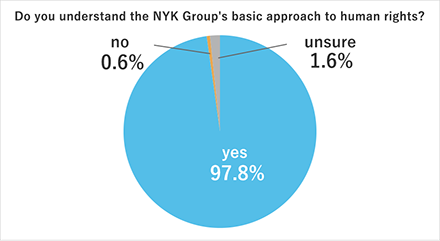
The NYK Group conducts human rights training for all executives and employees, including those of Group companies, through various programs such as e-learning, new employee training, and group trainings for expatriates, newly appointed managers, and newly appointed overseas senior management to instill in them an awareness of respect for human rights. We also aim to brief them on human rights risks in the Group's business and supply chain and the NYK Group's principles and rules regarding human rights. Every year, the NYK Group conducts human rights training through e-learning in three languages: Japanese, English and Chinese. We are working to deepen employees' understanding of the impact our Group's business can have on human rights, and we are making them aware of the NYK Group's commitment to respecting human rights. In fiscal 2023, a total of 8,131 NYK Group employees participated in our e-learning program. This represents a participation rate of 95%. The results of a follow-up awareness survey are as follows.
In addition, at training for new employees held in April and October every year, we brief employees on the importance of respecting human rights and remaining aware of human rights risks in their daily work. In fiscal 2023, the NYK Group conducted training for 94 new employees (new graduates and mid-career hires).
At group training sessions for expatriates, newly appointed managers, and newly appointed overseas senior management, we use actual examples of our initiatives for respecting human rights to brief employees on the latest trends in business and human rights as well as human rights issues in Japan and overseas.
Furthermore, to raise awareness of respect for human rights within NYK, we make staff aware of human rights issues through the company bulletin board every December during Human Rights Week. In fiscal 2023 "Developmental Disorder", "Buraku Liberation Issues" and "LGBT/SOGI" were featured as main themes.
Enlightenment and Education for Business Partners and Group Companies
To put into practice initiatives for respecting human rights throughout the supply chain in line with the United Nations Guiding Principles on Business and Human Rights, we share with our contractors and business partners various policies, such as our CSR Guidelines for Partners and Suppliers, and we request their compliance with these.
In addition, we conduct an annual HR Survey on human resource management and development targeting Group companies in Japan and overseas to confirm the status of compliance with the human rights and labor principles of the United Nations Global Compact (Principles 1 to 6). In fiscal 2023, we conducted the survey at 143 companies and achieved a response rate of 100%.
Membership in External Networks and Participation in Study Sessions
Through our membership in external networks and participation in study sessions, we gather the latest information on global trends and advanced cases concerning business and human rights, and we use this information and knowledge in internal education programs and initiatives for respecting human rights.
Since 2012, NYK has been participating in the Stakeholder Engagement Program (Human Rights Due Diligence Workshops) organized by CRT Japan. In this program, NGO/NPO representatives and human rights experts raise a wide range of issues centered on human rights issues that are attracting attention both in Japan and overseas. Based on the issues raised, the participating companies discuss prominent human rights issues and the importance of business activities for raising awareness of human rights and also identify and organize key human rights issues for each industry.
- More Information:
NYK is also a member of the Mitsubishi Human Rights Enlightenment Committee, which comprises Mitsubishi Group companies. The members participate in study sessions and share information on initiatives and the latest trends in respecting human rights.
NYK has also taken part in a human rights breakout session organized by Global Compact Network Japan and participates in study sessions, exchanges of opinion, and lectures on human rights issues with human rights managers of participating companies.
Grievance Mechanisms
NYK provides various grievance mechanisms that can be accessed by all employees of the Group to promptly deal with possible infringements of human rights.
The consultation services arranged by NYK include the Yusen Chat Room, the Harassment Policy and Consultation Service, the Internal Reporting Consultation Service, Work-life balance (Childcare, Nursing Care) Support Consultation Service, and LGBT Consultation Service. Employees can also directly consult with the department in charge of receiving consultations and directly consult with an external lawyer anonymously. Through these services, we receive various reports and queries from employees not only concerning whistleblowing reports but also all kinds of issues related to human rights, discrimination, and harassment, which employees face in the workplace, either in the name of the employees or anonymously, according to their wishes. We attempt to early identify, resolve, and remedy the problems. In addition to LGBT Consultation Service established in 2019, in fiscal year 2024, an external LGBT Consultation Service will be set up alongside, ensuring a greater psychological safety.
Details of consultations and grievances are communicated to relevant departments, impartial investigations are undertaken, and remedial measures based on internal procedures are taken.
We are working to familiarize employees with these grievance mechanisms through our internal portal site and through training. During Human Rights Week, information on these services is posted on the company bulletin board.
In addition, when providing consultation, NYK strictly maintains the confidentiality of the person seeking consultation as well as relevant parties, and also guarantees that no person will be treated disadvantageously as a result of making a report or seeking consultation, except in cases where such action has been for unfair reasons or through inappropriate methods.
Furthermore, through the inquiry form on our website, we accept not only inquiries about services of the NYK Group but also inquiries about concerns and requests for consultation related to human rights from all stakeholders including business partners and their employees, local communities, and customers. We protect the privacy of parties seeking consultation and ensure appropriate confidentiality.
Initiatives for LGBT/SOGI
The NYK Human Resources Group invites external instructors every year to conduct LGBT training sessions for new employees. In the fiscal year 2023, we also conducted LGBT training sessions specifically for our Human Resource Group members including responsible officers, and personnel involved in HR matters. Through face-to-face talks, lectures on fundamental LGBT issues, and group work, each new employee can gain new awareness and recognize the importance of diversity and inclusion.
In addition, we promote understanding of LGBT/SOGI through e-learning. Furthermore, a training program for the fiscal year 2023, whose theme was Diversity & Inclusion (D&I), and participating employees took the D&I certification exam. This exam covers wide range of topics including LGBT, which contributed to the participants' acquisition of foundational knowledge and understanding of social issues. We also provide an LGBT consultation service, conduct anonymous surveys, and invite LGBT experts to talk to employees. These initiatives aim to foster a greater understanding and acceptance of LGBT within our organizations.
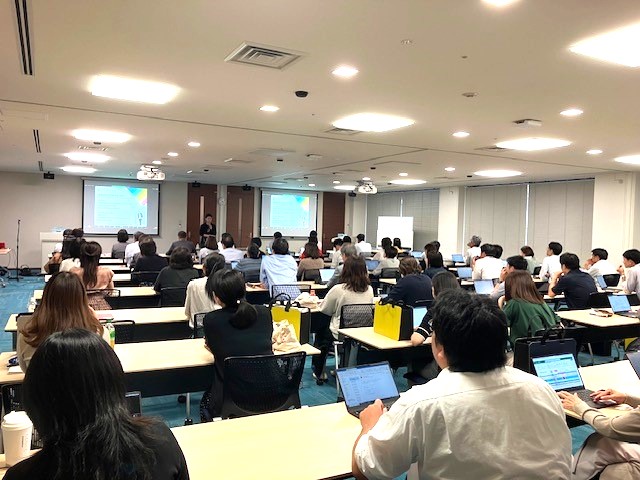
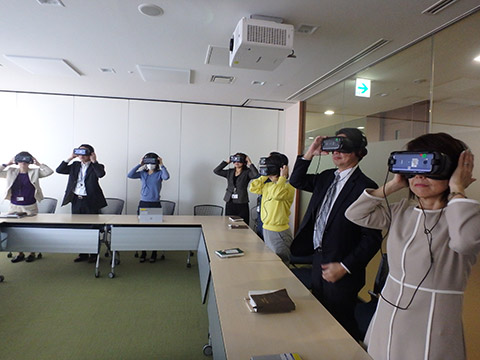
2023 LGBT and SOGI Awareness Survey Results
We conducted an anonymous awareness survey on LGBT and SOGI for employees working at NYK and our Group companies in Japan.
The survey aimed to check employees' level of understanding of LGBT and SOGI and investigate matters such as "problems and concerns in the working environment" and "requests for specific training and study opportunities."
Based on th survey results, NYK will continue its efforts to create a workplace environment where every individual values diversity and where diverse human resources can play an active role.
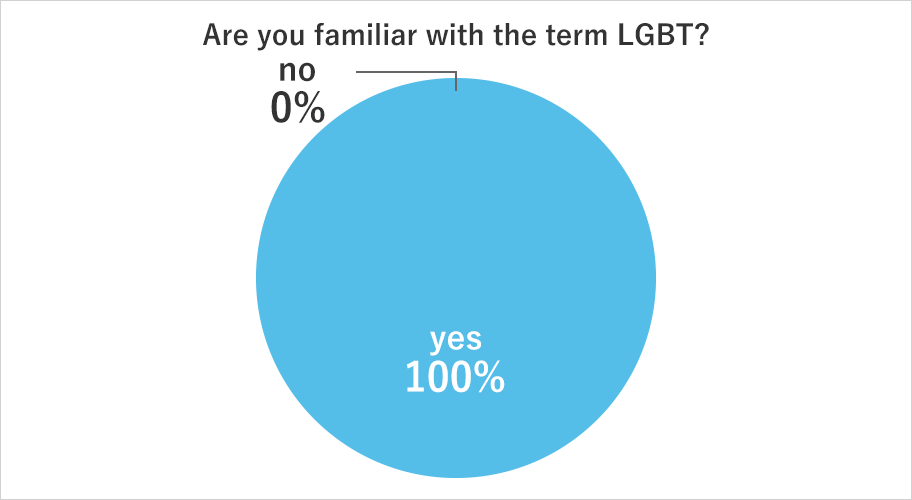
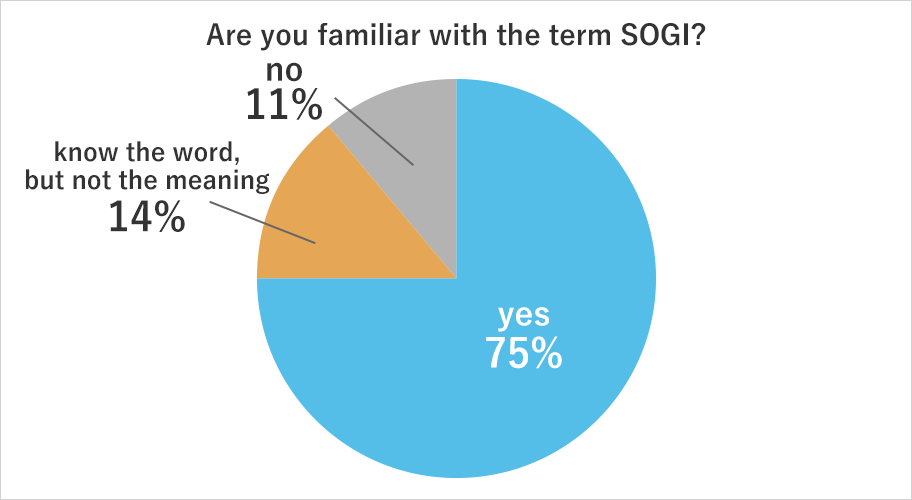
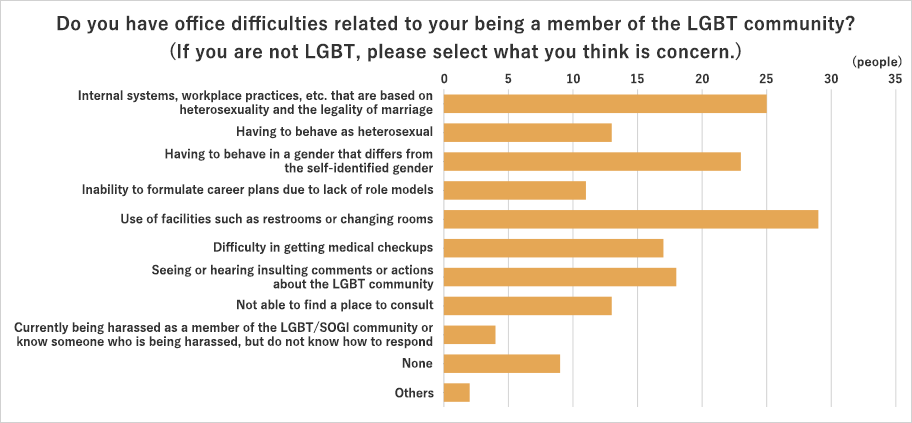
Collaboration with External Organizations
NYK engages in initiatives to raise awareness of human rights through collaboration with external organizations.
Rainbow Communication Badge (RCB) Project
To further promote D&I initiatives within our organization from fiscal year 2023, NYK supports the Rainbow Communication Badge (RCB) Project established by JobRainbow Co. Ltd., a company that supports LGBT job placement, education, and consulting services.
The RCB Project aims for an inclusive society without discrimination or prejudice. By wearing the Rainbow badge, we can create a reassuring environment for customers, business partners, and employees.
The recommended period for wearing the badge in 2024 is from April 19 to May 18, although NYK recommends wearing the badge throughout the year and has promotional displays with badges throughout the head office.
More information about NYK's participation in this project can be found at the following link (Japanese only).
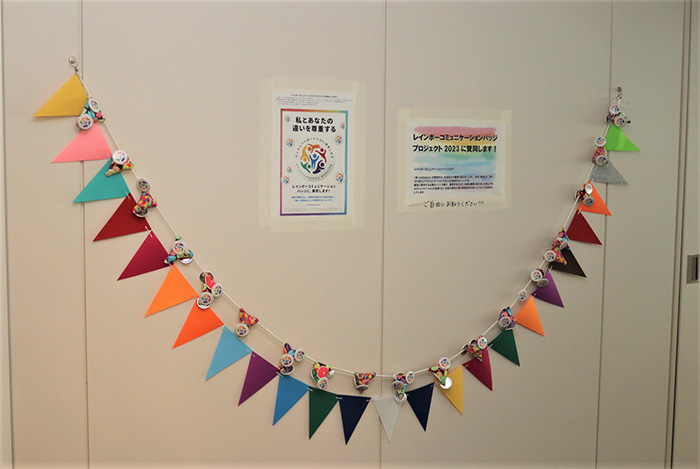
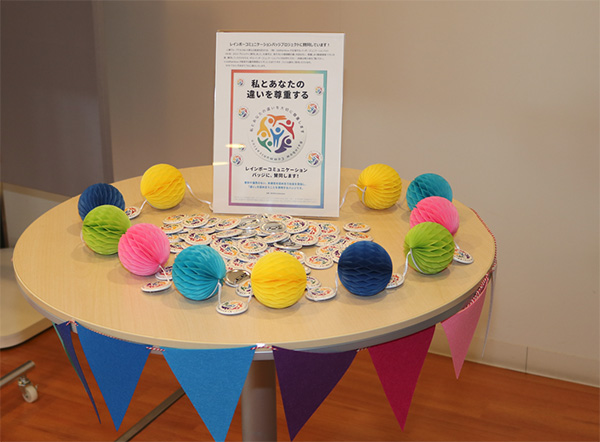
- More Information:
Collaboration with Amnesty International Japan
Panel Exhibition of Universal Declaration of Human Rights at NYK Maritime Museum
The NYK Maritime Museum held a panel exhibition on human rights from January 18 to February 16, 2020, in collaboration with Amnesty International Japan. The display panels illustrated all 30 Articles of the Universal Declaration of Human Rights in approachable illustrations that had been translated to easy-to-understand Japanese.
The museum also hosted an event that used virtual reality to allow visitors to experience the challenges refugees face.
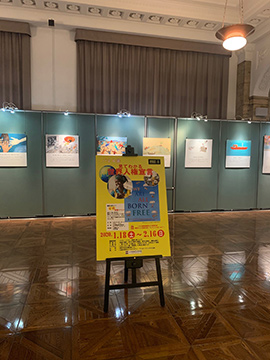
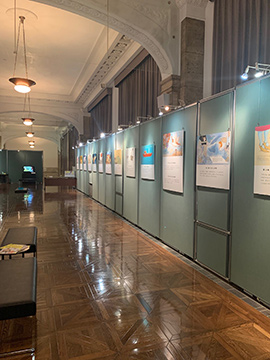
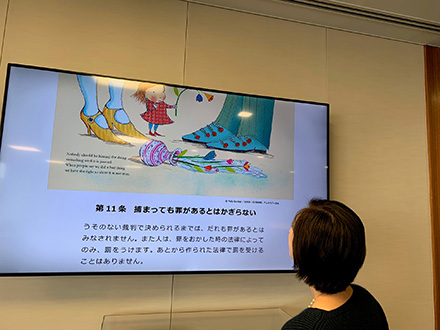
NYK also displayed a Universal Declaration of Human Rights digital slide show in the head office visitor space from November to December 2019 to coincide with Human Rights Week.
Sponsorship of Film Festival Hosted by Amnesty International Japan
On August 17, 2019, NYK sponsored a movie screening of “Fire at Sea,” or “Fuocoammare” in its original Italian. The documentary captures life on the Italian island of Lampedusa, a frontline in the European migrant crisis. Amnesty International Japan hosted the event, and NYK sponsored the film festival to raise interest in human rights issues in Japan.

